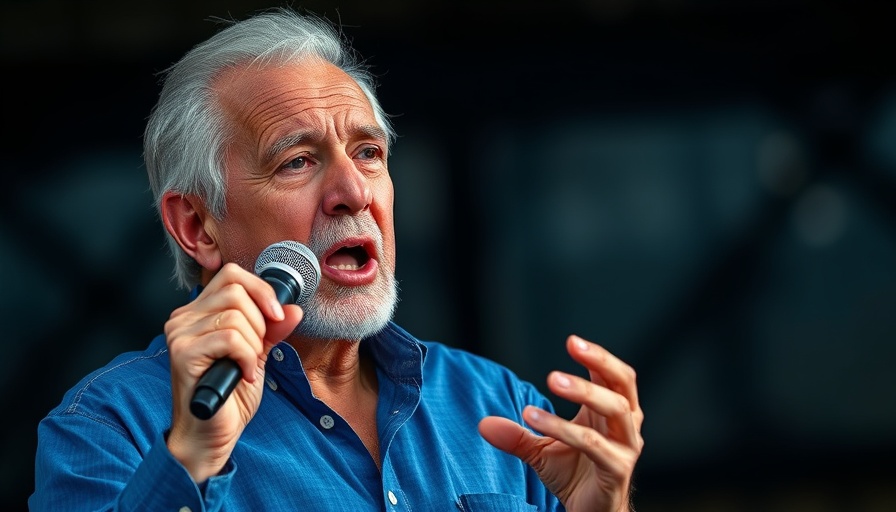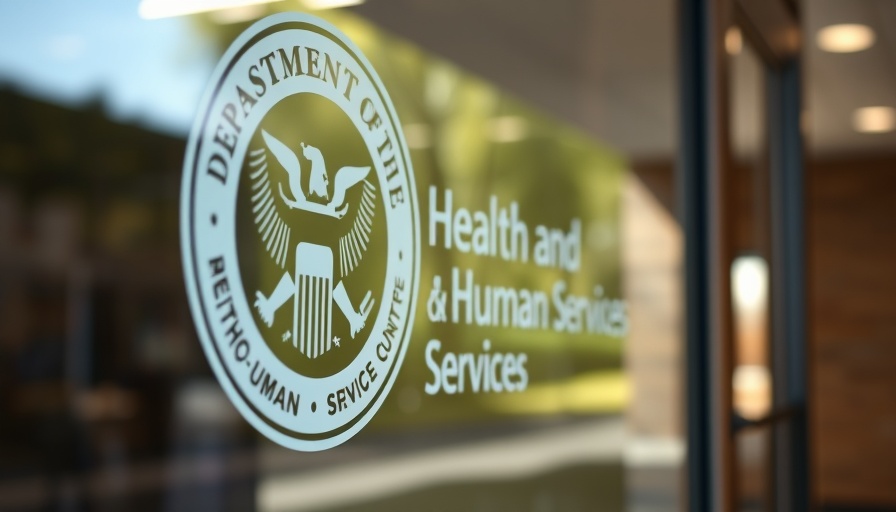
 Add Row
Add Row  Add Element
Add Element  Add Row
Add Row  Add Element
Add Element Public Health in Turmoil: Conservative Host Condemns GOP Senator's Inaction on Vaccine Advisory Board


HHS Restores Public Trust: Major Changes to Vaccine Advisory Committee
Update Restoring Trust: HHS Takes Major Steps to Revamp Vaccine Advisory Committee In a bold move aimed at reinstating public confidence, the U.S. Department of Health and Human Services (HHS) has announced a significant overhaul of the Advisory Committee on Immunization Practices (ACIP). All 17 members of the committee were removed, reflecting HHS Secretary Robert F. Kennedy Jr.'s commitment to transparency and impartiality in vaccine recommendations. This decision is fueled by a growing demand for unbiased recommendations based on sound science, distancing the advisory group from any potential industry influences. Understanding the Context: Why Now? The decision to overhaul the ACIP comes in the wake of rising skepticism surrounding vaccine efficacy and safety in the United States. Following the pandemic, as public scrutiny intensified, confidence in health authorities dwindled. Kennedy emphasized that a "clean sweep" of committee members was crucial in reestablishing credibility. With the previous members appointed by the previous administration, this clean slate serves as a fresh start to realign national immunization strategies with public health priorities. What Does This Mean for Public Health? The ACIP holds substantial power in determining national vaccine schedules, making its integrity vital for public health. By prioritizing a transparent appointment process, HHS aims to ensure that scientific recommendations are no longer influenced by profit motives. In times of uncertainty, the public looks to health regulators for reliable guidance; therefore, reinstating their confidence is paramount. A Fresh Start: New Directions for the ACIP Kennedy's assurance that new members will be chosen based on their commitment to public health and evidence-based medicine marks a pivotal shift. The next ACIP meeting scheduled for June 25-27 at the CDC headquarters will set the stage for these new voices to contribute fresh insights and initiatives. Their influence could direct the future of vaccination campaigns and establish new norms in public health strategy. Moving Towards Radical Transparency One of HHS's foundational goals moving forward is radical transparency. By providing the public with insight into how decisions are made and the evidence that supports them, HHS believes that trust can be rebuilt. Kennedy's statement, highlighting the need for "gold standard science," reflects an understanding that consumers want more than just recommendations—they seek assurance backed by clear, accessible data. Impact on Vaccine Perception and Acceptance With vaccine hesitancy and misinformation continuing to be significant challenges, the reorganization of the ACIP may have a profound impact on vaccine acceptance. As new committee members take their positions, they are expected to engage with communities, actively addressing questions and concerns that have contributed to public doubt. This approach could pave the way for more informed, healthier decisions regarding vaccinations. Looking Ahead: A Call for Community Engagement Public health is inherently a community concern; therefore, involving citizens in discussions about vaccines and health practices is crucial. The new ACIP will need to create forums to hear public input, harnessing community experiences and perspectives to inform their recommendations. As Kennedy noted, restoring trust is a collective effort that requires understanding and addressing the public's needs. Conclusion: The Significance of Informed Choices As we navigate through these changes, it becomes clear that informed choices stem from transparent and trustworthy recommendations. The HHS's commitment to restoring confidence in vaccinations is both essential and timely. For individuals and communities alike, this approach can serve as a model for proactive health engagement—one where decisions are rooted in science, dialogue, and shared goals for public well-being.

Could Medical Marijuana Transform Leg Injury Recovery? Here's What You Need to Know
Update The Growing Role of Medical Marijuana in Recovery Leg injuries can be more than just physical challenges; they can impact every aspect of a person's life. Traditional treatments often involve pain medications that can lead to dependence or unwanted side effects. As medical marijuana gains traction for its potential to ease pain and promote healing, many are asking: could this be a viable alternative? Understanding the Science Behind Medical Marijuana Medical marijuana isn't just a trend; there’s robust science supporting its benefits. The human body is equipped with an endocannabinoid system that regulates various functions, including pain, mood, and inflammation. Compounds in cannabis, particularly THC and CBD, interact with this system to provide relief. THC, the psychoactive ingredient, is noted for its ability to diminish pain sensitivity and ease inflammation, making it particularly relevant for individuals recovering from leg injuries. A Holistic Approach to Healing Leg injuries often lead not only to physical symptoms but also emotional challenges. Patients may experience anxiety or depression due to decreased mobility and prolonged recovery times. Medical marijuana, particularly in forms like THC gummies, can enhance the recovery process by offering a mood lift and reducing stress. This multidimensional effect of cannabis can help individuals stay positive during what can be a frustrating healing period. Practical Insights: The Benefits of Gummies THC gummies are becoming a favored option for those seeking to manage leg injury recovery. Their precise dosing makes it easier for patients to monitor intake, which is especially beneficial for those new to cannabis. Each gummy provides a consistent dose of THC, taking the guesswork out of consumption and helping users achieve desired effects more reliably. Additionally, the enjoyable nature of gummies makes adhering to treatment a more pleasant experience. Future Predictions: A Shift in Pain Management Strategies As more research emerges and public perception shifts, we may see medical marijuana becoming a staple in pain management strategies, particularly for sports-related injuries. With professional athletes starting to endorse cannabis use for recovery, it's possible that societal acceptance will grow, leading to more comprehensive pain management solutions that include marijuana. This could pave the way for medical professionals to incorporate cannabis into rehabilitation protocols. Challenges and Considerations Despite the promising benefits, there are still hurdles to navigate. Regulatory barriers and the stigma surrounding marijuana use can prevent some patients from accessing its benefits. Additionally, each individual may react differently to cannabinoids, underscoring the need for personalized treatment plans. It's crucial for patients to consult with healthcare providers familiar with cannabis to optimize its use in their recovery strategy. A Healthier Perspective on Treatment Options Finding effective, safe treatment options is a priority for anyone experiencing leg injuries. By exploring alternatives like medical marijuana, patients can reduce their reliance on traditional pain medications while still promoting recovery. As our understanding of this compound grows, so does the potential to transform the landscape of injury recovery. Although medical marijuana may not be for everyone, increasing dialogue around its use can lead to improved treatment protocols and better-informed patients. As research sheds light on the full capacity of cannabis in healthcare, embracing this option could enhance recovery journeys for many.

Revolutionizing Knee Pain Management: The Rise of Stem Cell Therapy
Update A New Hope for Knee Osteoarthritis Sufferers Finding effective treatment for knee osteoarthritis (OA) has always been a challenge, but a new glimmer of hope has emerged in the form of Autologous Bone Marrow Stem Cell Therapy (BMAC). This innovative approach has quickly gained traction, especially following recent studies showcasing its potential to significantly alleviate pain for those struggling with this debilitating condition. The Efficacy of BMAC Injections According to a series of eight studies, the BMAC injection has been proven to be effective in providing substantial relief for patients suffering from early to mid-stage knee osteoarthritis. The findings indicate that an impressive 94.4% of participants experienced considerable pain reduction after the treatment. This stands in stark contrast to earlier management methods, where corticosteroid injections were commonly prescribed and often led to accelerated joint degeneration. Research has revealed that although corticosteroids may provide temporary relief, they can also hasten cartilage deterioration and inflammation, ultimately worsening the patient's condition. Shifting Perspectives on Treatment Options As the healthcare landscape continues to evolve, doctors and specialists are emphasizing patient education on various treatment options. Dr. Yeong-Seok Lee, director of Saint Luke Hospital, emphasizes the importance of timely diagnosis and intervention. "If knee pain is severe enough to interfere with daily life," he warns, "it's crucial to seek specialized care as early as possible." This advice is particularly poignant for individuals who may have relied on traditional methods that can lead to long-term damage. Why BMAC Therapy Stands Out The spotlight on BMAC therapies can be attributed to their innovative nature and proven results. Unlike traditional corticosteroid treatments, BMAC therapies focus on utilizing the patient's own stem cells to promote healing and reduce inflammation. This cellular approach not only alleviates pain but also fosters tissue regeneration, setting the stage for long-term improvements in function and mobility. Common Misconceptions About Stem Cell Treatments Despite the promising results, many misconceptions about BMAC treatments linger in public discourse. One common myth is that stem cell therapy is experimental and lacks substantial backing. On the contrary, the BMAC method has undergone rigorous clinical study leading to its approval as a new medical technology in South Korea in 2021. Patients are encouraged to seek out credible information and consult with healthcare professionals to debunk these myths and recognize the legitimacy of available treatments. The Path Ahead: Future Insights and Adaptations With the growing acceptance of innovative therapies like BMAC, there is a bright future for knee osteoarthritis treatment. The need for comprehensive and safe alternatives to traditional corticosteroid injections paves the way for further research and development. As more studies are conducted, it is likely that we will uncover additional benefits and possibly new methodologies that will refine treatment protocols even further. Empowering Patients Through Knowledge Knowledge is power, especially when it comes to managing chronic conditions like knee osteoarthritis. By staying informed about emerging treatment options, patients can have more constructive discussions with their healthcare providers and make choices that align with their personal health goals. BMAC therapy represents not just a treatment but a movement toward a more holistic approach to knee health and pain management. As you explore the possibilities that BMAC injections and similar techniques offer, consider the positive impact they may have on your quality of life. While navigating treatment paths can feel overwhelming, being proactive and informed gives you a better chance at a more comfortable and functional future. If you or a loved one is facing knee pain, it may be worthwhile to reach out to healthcare professionals specializing in innovative therapies. The journey to pain relief and enhanced mobility might just be a conversation away.
 Add Row
Add Row  Add Element
Add Element © 2025 Miami Healthy Living All Rights Reserved. 136 Center St, Oak Hill, FL 32759 . Contact Us . Terms of Service . Privacy Policy


Write A Comment